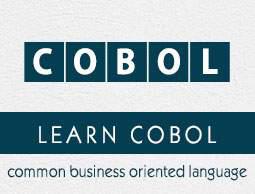COBOL - Loop Statements
There are some tasks that need to be done over and over again like reading each record of a file till its end. The loop statements used in COBOL are −
- Perform Thru
- Perform Until
- Perform Times
- Perform Varying
Perform Thru
Perform Thru is used to execute a series of paragraph by giving the first and last paragraph names in the sequence. After executing the last paragraph, the control is returned back.
In-line Perform
Statements inside the PERFORM will be executed till END-PERFORM is reached.
Syntax
Following is the syntax of In-line perform −
PERFORM
DISPLAY 'HELLO WORLD'
END-PERFORM.
Out-of-line Perform
Here, a statement is executed in one paragraph and then the control is transferred to other paragraph or section.
Syntax
Following is the syntax of Out-of-line perform −
PERFORM PARAGRAPH1 THRU PARAGRAPH2
Example
IDENTIFICATION DIVISION.
PROGRAM-ID. HELLO.
PROCEDURE DIVISION.
A-PARA.
PERFORM DISPLAY 'IN A-PARA'
END-PERFORM.
PERFORM C-PARA THRU E-PARA.
B-PARA.
DISPLAY 'IN B-PARA'.
STOP RUN.
C-PARA.
DISPLAY 'IN C-PARA'.
D-PARA.
DISPLAY 'IN D-PARA'.
E-PARA.
DISPLAY 'IN E-PARA'.
JCL to execute the above COBOL program.
//SAMPLE JOB(TESTJCL,XXXXXX),CLASS = A,MSGCLASS = C
//STEP1 EXEC PGM = HELLO
When you compile and execute the above program, it produces the following result −
IN A-PARA
IN C-PARA
IN D-PARA
IN E-PARA
IN B-PARA
Perform Until
In ‘perform until’, a paragraph is executed until the given condition becomes true. ‘With test before’ is the default condition and it indicates that the condition is checked before the execution of statements in a paragraph.
Syntax
Following is the syntax of perform until −
PERFORM A-PARA UNTIL COUNT=5
PERFORM A-PARA WITH TEST BEFORE UNTIL COUNT=5
PERFORM A-PARA WITH TEST AFTER UNTIL COUNT=5
Example
IDENTIFICATION DIVISION.
PROGRAM-ID. HELLO.
DATA DIVISION.
WORKING-STORAGE SECTION.
01 WS-CNT PIC 9(1) VALUE 0.
PROCEDURE DIVISION.
A-PARA.
PERFORM B-PARA WITH TEST AFTER UNTIL WS-CNT>3.
STOP RUN.
B-PARA.
DISPLAY 'WS-CNT : 'WS-CNT.
ADD 1 TO WS-CNT.
JCL to execute the above COBOL program −
//SAMPLE JOB(TESTJCL,XXXXXX),CLASS = A,MSGCLASS = C
//STEP1 EXEC PGM = HELLO
When you compile and execute the above program, it produces the following result −
WS-CNT : 0
WS-CNT : 1
WS-CNT : 2
WS-CNT : 3
Perform Times
In ‘perform times’, a paragraph will be executed the number of times specified.
Syntax
Following is the syntax of perform times −
PERFORM A-PARA 5 TIMES.
Example
IDENTIFICATION DIVISION.
PROGRAM-ID. HELLO.
PROCEDURE DIVISION.
A-PARA.
PERFORM B-PARA 3 TIMES.
STOP RUN.
B-PARA.
DISPLAY 'IN B-PARA'.
JCL to execute the above COBOL program −
//SAMPLE JOB(TESTJCL,XXXXXX),CLASS = A,MSGCLASS = C
//STEP1 EXEC PGM = HELLO
When you compile and execute the above program, it produces the following result −
IN B-PARA
IN B-PARA
IN B-PARA
Perform Varying
In perform varying, a paragraph will be executed till the condition in Until phrase becomes true.
Syntax
Following is the syntax of perform varying −
PERFORM A-PARA VARYING A FROM 1 BY 1 UNTIL A = 5.
Example
IDENTIFICATION DIVISION.
PROGRAM-ID. HELLO.
DATA DIVISION.
WORKING-STORAGE SECTION.
01 WS-A PIC 9 VALUE 0.
PROCEDURE DIVISION.
A-PARA.
PERFORM B-PARA VARYING WS-A FROM 1 BY 1 UNTIL WS-A=5
STOP RUN.
B-PARA.
DISPLAY 'IN B-PARA ' WS-A.
JCL to execute the above COBOL program −
//SAMPLE JOB(TESTJCL,XXXXXX),CLASS = A,MSGCLASS = C
//STEP1 EXEC PGM = HELLO
When you compile and execute the above program, it produces the following result −
IN B-PARA 1
IN B-PARA 2
IN B-PARA 3
IN B-PARA 4
GO TO Statement
GO TO statement is used to change the flow of execution in a program. In GO TO statements, transfer goes only in the forward direction. It is used to exit a paragraph. The different types of GO TO statements used are as follows −
Unconditional GO TO
GO TO para-name.
Conditional GO TO
GO TO para-1 para-2 para-3 DEPENDING ON x.
If 'x' is equal to 1, then the control will be transferred to the first paragraph; and if 'x' is equal to 2, then the control will be transferred to the second paragraph, and so on.
Example
IDENTIFICATION DIVISION.
PROGRAM-ID. HELLO.
DATA DIVISION.
WORKING-STORAGE SECTION.
01 WS-A PIC 9 VALUE 2.
PROCEDURE DIVISION.
A-PARA.
DISPLAY 'IN A-PARA'
GO TO B-PARA.
B-PARA.
DISPLAY 'IN B-PARA '.
GO TO C-PARA D-PARA DEPENDING ON WS-A.
C-PARA.
DISPLAY 'IN C-PARA '.
D-PARA.
DISPLAY 'IN D-PARA '.
STOP RUN.
JCL to execute the above COBOL program:
//SAMPLE JOB(TESTJCL,XXXXXX),CLASS = A,MSGCLASS = C
//STEP1 EXEC PGM = HELLO
When you compile and execute the above program, it produces the following result:
IN A-PARA
IN B-PARA
IN D-PARA



